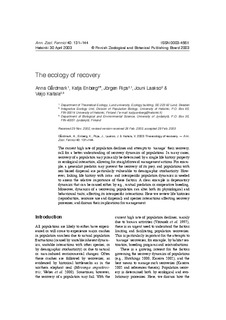| dc.description.abstract | The current high rate of population declines and attempts to `manage' their recovery, call for a better understanding of recovery dynamics of populations. In many cases, recovery of a population may primarily be determined by a single life history property or ecological interaction, allowing for straightforward management actions. For example, a generalist predator may prevent the recovery of its prey, and populations with sex-biased dispersal are particularly vulnerable to demographic stochasticity. However, linking life history with intra- and interspecific population dynamics is needed to assess the relative importance of these factors. A clear example is depensatory dynamics that can be caused either by e.g., mutual predation or cooperative breeding. Moreover, dynamics of a recovering population can alter both its physiological and behavioural traits, affecting its interspecific interactions. Here we review life histories (reproduction, resource use and dispersal) and species interactions affecting recovery processes, and discuss their implications for management. | en_US |
